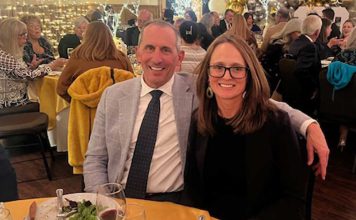
When it comes to garbage, recyclables or yard waste, once the bins hit the curb, that’s it. Goodbye to bad rubbish.
There’s life after trash, however. Plastic can turn into anything from winter coats to playground equipment. Recycled aluminum may become cars, bikes, or airplane parts. The possibilities can be staggering. The same is true for your yard clippings and food waste, and Recology, through its company South Valley Organics, turns the toil of your yard work into new, resellable compost.
This composting operation takes place outside of Gilroy about a quarter-mile off Pacheco Pass Highway. On nearly every weekday of the year, trucks haul in 150 tons of organics to South Valley Organics’ 16-acre site.
After the trucks pass over scales that weigh the organics, the material is dumped into piles, which then go through mechanical grinders. The ground-up material is then made into windrows, mounds about 7 feet high and 100 feet long. There, in the windrows, microscopic gourmets devour the harmful bacteria.
Scientifically, these gourmets are microorganisms that include bacteria and fungi which, through a natural process, break down the material with the help of oxygen and water. In a way, the organisms are cooking the compost, and the natural heat, which reaches 130 degrees F, can be seen through escaping gasses or felt by the touch.
Next to South Valley Organic’s composting center lies the remains of the old landfill, which contains generations of trash from Gilroy and Morgan Hill.
The landfill was closed in 2008 and is now covered with grass. Methane exhaust pipes that burn away gas that continues to emanate from the remaining refuse dot the landscape. Each tube is fitting with burners that continuously burn away harmful gasses. The state mandated a 30-year post-closure monitoring plan to watch over the former landfill.
The material comes from Gilroy, Morgan Hill, Pacifica, Cupertino, Mountain View, San Bruno and soon, Hollister. There are 10 employees at South Valley Organics, who work from 7am to 3:30pm.
Before the compost is ready to be sold, South Valley Organics sends samples to a Watsonville laboratory where the lab tests the compost for metals and contaminants.
South Valley Organics sells its compost wholesale. One of its most significant clients is Lyngso, which then sells the compost to big-box garden stores. The compost is sold by the cubic yard at market price. South Valley Organics would not disclose how much per pound they charge for their compost.
The compost is turned over with loaders to keep the compost moist. The longer the piles sit, the hotter they get, which is vital to the composting process.
South Valley Organics sprays the compost with water collected in a 4 million-gallon pond downhill from the compost yard. The water is funneled down through pipes and pumped back up for storage in five 10,000-gallon tanks.
While the nose of the beholder determines the smell, the compost yard at South Valley Organics smells faintly like pine and lawn clippings. The site is also popular with wildlife, particularly crows that poke around the compost searching for seeds. Mountain lions, wild pigs, coyotes and deer visit the site on a regular basis.














